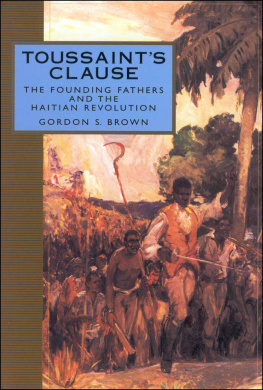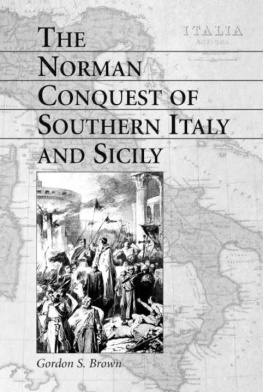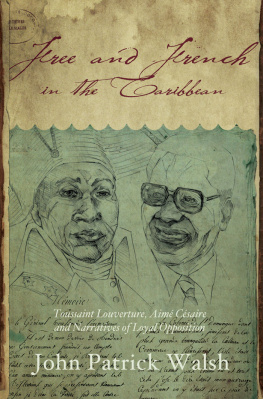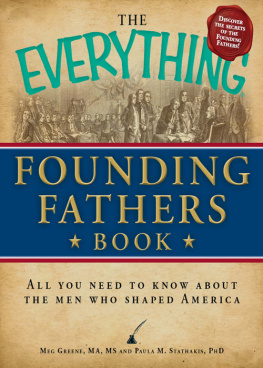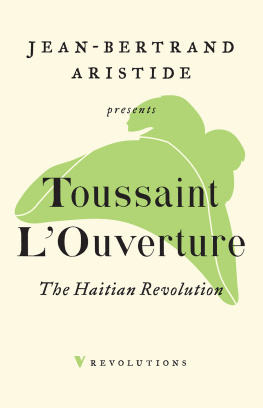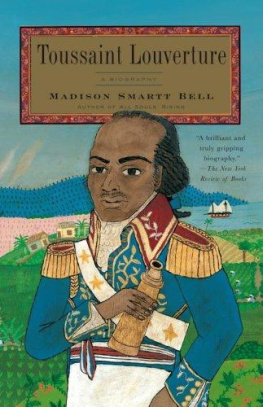Toussaints Clause
TOUSSAINTS CLAUSE
The Founding Fathers and the Haitian Revolution
Gordon S. Brown

www.upress.state.ms.us
The University Press of Mississippi is a member of the Association of American University Presses.
Copyright 2005 by Gordon S. Brown
All rights reserved
Manufactured in the United States of America
12 11 10 09 08 07 06 05 4 3 2 1

Library of Congress Cataloging-in-Publication Data
Brown, Gordon S., 1936
Toussaints clause : the founding fathers and the Haitian revolution / Gordon S. Brown.
p. cm.
An ADST-DACOR diplomats and diplomacy book.
Includes bibliographical references and index.
ISBN 1-57806-711-1 (cloth : alk. paper)
1. United StatesForeign relations1789-1809. 2. Toussaint Louverture, 1743?i803. 3. United StatesForeign relationsHaiti. 4. HaitiForeign relationsUnited States. 5. HaitiHistoryRevolution, 1791-1804. I. Title.
E310.7.B76 2005
327.73072940933dc22 2004010403
British Library Cataloging-in-Publication Data available
CONTENTS
FOREWORD
For nearly 230 years extraordinary men and women have represented the United States abroad under all kinds of circumstances. What they did and how and why they did it remain little known to their compatriots. In 1995 the Association for Diplomatic Studies and Training (ADST) and Diplomatic and Consular Officers, Retired (DACOR) created a book series to increase public knowledge and appreciation of the involvement of American diplomats in world history. The series seeks to demystify diplomacy by telling the story of those who have conducted our foreign relations, as they lived, observed, and reported them. Former ambassador Gordon Browns lively study of early American foreign relations and economic diplomacy, Toussaints Clause: The Founding Fathers and the Haitian Revolution, advances these aims.
Brown relates how Americas early leaders and their diplomatic representatives dealt with the politically sensitive issue of the 1790-1810 slave rebellion in Haiti led by Toussaint Louverture. Founding fathers Washington, Adams, Hamilton, Jefferson, and Madison struggled with the dilemma of how to protect Americas highly profitable trade with the rich French colony while ensuring Americas national security and maintaining its beneficial position of neutrality between the warring European powers. The leaders policy toward the revolt was consistent on only one pointthe need to protect America from what they saw as Haitis radicalism. Americas diplomats contributed significantly to resolving the controversy. Although communications were often slow, insecure, uncertain, and frequently overtaken by events, this left room for a degree of improvisation unthinkable today.
Before turning to historical and analytical writing, Gordon S. Brown spent thirty-five years in the Foreign Service, mainly in the Middle East and North Africa. He served as political advisor to General Norman Schwarzkopf in the first Gulf War and as ambassador to Mauritania. His previous publications include Coalition, Coercion and Compromise: Diplomacy of the Gulf Crisis, 19901991 (Institute for the Study of Diplomacy, 1997) and The Norman Conquest of Southern Italy and Sicily (McFarland, 2003).
In Toussaints Clause, Gordon Brown vividly recounts how, from the nations earliest days, fiercely partisan politics, congressional constraints, the pressure of economic interest groups, bureaucratic ambition, and larger foreign and domestic goals shaped, and then reshaped, critical foreign policies.
KENNETH L. BROWN, President
Association for Diplomatic Studies and Training
ROBERT L. FUNSETH, President
Diplomatic and Consular Officers, Retired
PREFACE
The formation of foreign policy is not a tidy, nor a linear, process. A career spent in the American diplomatic service served to show this author how apparently lucid considerations of national interest can be influenced, and sometimes even perverted, by the impact of personality, bureaucratic considerations, and, above all, domestic politics. Our founding fathers lived in what seems to us today a much simpler world, yet it was nonetheless one where many of those same considerations had great weight. Our policy toward revolutionary HaitiSt. Domingo in the parlance of the timewas no exception.
This book had its origin in a fit of curiosity. I wanted to know more about Toussaint Louverture, that iconic figure about whom most Americans have, at best, only a shadowy knowledge. I began to read the record. There, I learned for the first time how closely the Haitian revolution had touched early American politics, and how crucially the American and Haitian stories were intertwined during the exciting decade that saw the United States take its first foreign policy initiatives, and make the fateful Louisiana Purchase. The book flowed easily from the drama that I saw in this often overlooked story, and from the desire to dissect it as a sort of case study as to how American foreign policy was made.
I am most appreciative for the two superb institutions that house most of the information on which this book is based: the Library of Congress and the National Archives. Helpful staff and comfortable, even inspiring working conditions have made the research a pleasure. Our tax dollars are well spent.
Several notes are necessary to explain spelling and other features of the text that may give readers pause. First, the use of archaic spellings in the quotations. I have tried to preserve the original spellings wherever possible, both to give a greater sense of authenticity to the pieces and to avoid creating my own template of grammatical or orthographic correctness. I did, however, alter the original grammar on those few occasions when the document otherwise would have made little sense to a modern reader. For documents translated from the original French, on the other hand (primarily Turner and the items from the French archives), I used modern spellings, but stuck as closely as possible to the original grammar. Any errors in translation are mine alone.
I have chosen to spell the folk religion of Haiti by its most commonly recognized form of voodoo, although many specialists prefer vodou or other variations that correspond more closely to the local dialect.
Names can also create difficulty. The modern country of Haiti is called St. Domingo in most of the text, because that is what it was called by the Americans at the time. But the French name, St. Domingue, is also used in situations or quotations that are purely French. And a third name, Haiti, is even used toward the end of the book, after the colony had taken the final step of independence and adopted that new name. I hope there will be no confusion. I have, in a similar spirit of using contemporary nomenclature, referred to Toussaint Louverture exclusively as Toussaint, without his surname. The surname, which he adopted in the process of the anticolonial struggle, was used primarily in his own country at the time. Elsewhere, he was generally known by his given name, and that usage corresponds to the texts and quotations employed here.
Finally, it should be noted that quotations from the Annals of Congress are usually not direct quotes. As there was no verbatim record taken of the debates at the time, the quotations represent paraphrases, or stenographic records of unknown completeness, that were used to compile the
Next page
